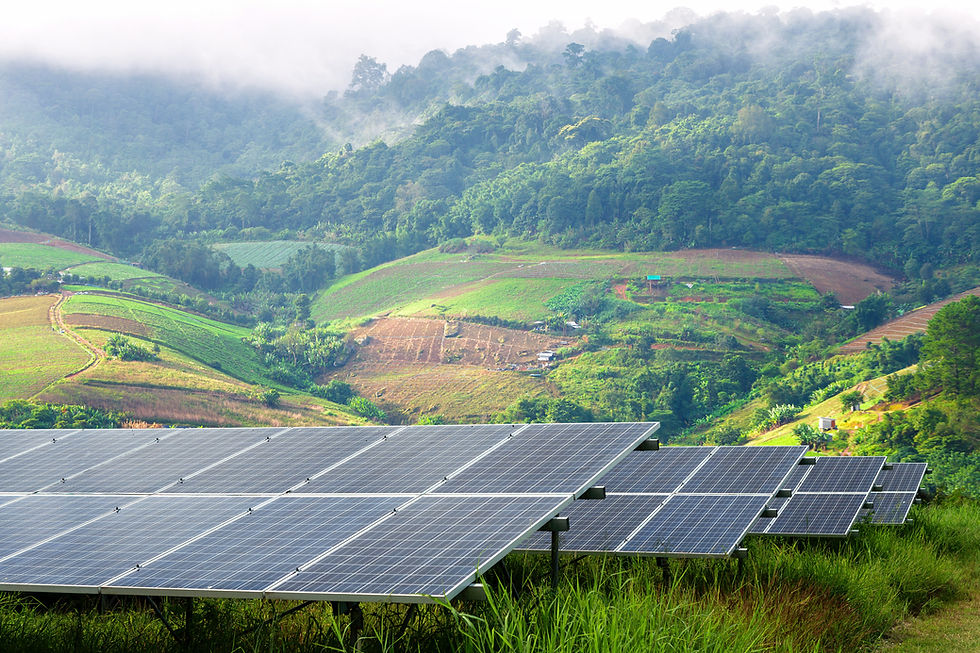Innovative applications of Solar energy: From Smart Cities to Transportation
- Connie Duxbury

- May 31, 2024
- 3 min read
Solar energy is one of the most abundant and sustainable energy resources available to us. With advancements in technology, it is increasingly being harnessed for various applications that go beyond merely powering homes or commercial spaces. This blog will delve into three such innovative applications of solar energy in the realms of agriculture, transportation, and smart cities.
Solar Energy in Smart Cities

Smart cities around the world are integrating solar energy into their infrastructure in innovative ways. Solar street lights, for example, are a common sight in many cities, providing reliable and cost-effective illumination. Additionally, solar-powered smart benches that offer WiFi connectivity and charging ports are being installed in public spaces. Some cities are also experimenting with solar roads that generate electricity while serving their primary function. People are also using Solar based home decor items like solar LED Lights, solar garden irrigation systems etc. Community energy groups have played a vital role in reducing energy bills and creating local jobs in energy solutions. Read more about what community energy groups are.
Solar Energy in Agriculture

Modern agriculture has found a sustainable partner in solar energy. Solar-powered irrigation systems, for instance, are transforming the landscape of water-intensive agriculture. They help farmers in remote areas, where access to an electric grid is limited, to irrigate their fields efficiently. Furthermore, solar energy is also being used to power greenhouse operations, ensuring optimal growing conditions for crops throughout the year, irrespective of seasonal changes.
Solar Energy in Transportation

The transportation sector is also witnessing a solar revolution. Solar-powered vehicles are emerging as a viable solution to reduce greenhouse gas emissions and dependency on fossil fuels. From cars to boats and even planes, solar panels are being used to generate power for movement. Not only this, but solar energy is also being used to power electric vehicle charging stations, further reducing the carbon footprint of transportation.
Future Prospects of Solar Energy
Looking ahead, the future of solar energy appears bright and promising. With continuous advancements in technology, it's likely that we'll see even more innovative and efficient ways of harnessing solar power. For instance, the development of floating solar farms, also known as 'floatovoltaics', is a cutting-edge innovation. These floating installations overcome the challenge of land scarcity and also improve the efficiency of solar panels by keeping them cool.
Moreover, scientists are working on creating transparent solar panels that could replace conventional windows, further integrating solar energy into our everyday lives. This technology could transform every glass surface into a potential power source, from the windows in our homes to the glass facades of skyscrapers.
The field of solar-powered transportation is also expected to expand beyond vehicles to include public transit systems like buses and trains. The concept of solar roads, which generate electricity while serving their primary function, is also gaining traction.
In conclusion, the horizon of solar energy is expansive, filled with potential and promise. As we continue to innovate and invest in this renewable source of energy, we could shape a future where solar power is an integral part of our daily lives, powering our homes, vehicles, cities, and much more. The sun, indeed, has the potential to fuel our progress towards a sustainable and greener future.
Conclusion
The potential applications of solar energy are vast and varied. As we continue to explore new ways of harnessing this renewable energy source, we can expect to see even more innovative applications that contribute to a sustainable future. The examples discussed in agriculture, transportation, and smart cities are just the tip of the iceberg. The solar revolution is indeed upon us, and it's high time we embrace it.
Solar energy, with its wide-ranging applications, is not just an alternative but a preferred source of energy for a greener future. Its integration into various sectors of our lives showcases how renewable energy can lead to economic growth, environmental preservation, and societal benefits. The sun is more than just a celestial body; it's a powerhouse that fuels our progress.












Comments